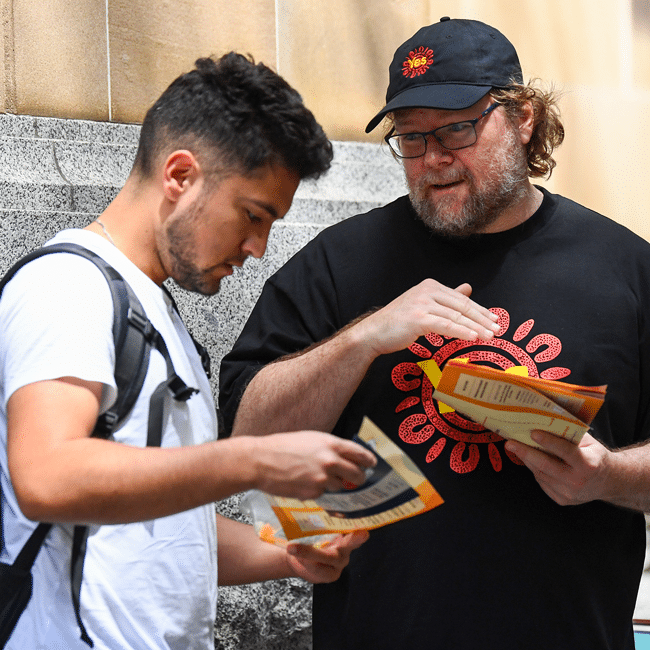
Will I, won’t I? How to sort out a large inheritance
Opinion + AnalysisRelationships
BY Sally Murphy The Ethics Centre 21 MAY 2018
Torn between rights and obligations, a long-suffering widower agonises over how to divvy up his assets, while an aunt’s growing nest egg is in danger of being squandered. This month we are talking about inheritance on Ethi-call.
Disclaimer: The cases shared here are fictional accounts of typical dilemmas faced by callers who use The Ethics Centre’s free helpline Ethi-call. This is not a substitute for an Ethi-call counselling session.
Inheritance is a sticky issue. No matter your role – the writer of the will, the executor, the recipient, or the advisor – each individual has a view of how important justice, fairness, obligations, or rights are in making their decisions. If you’re lucky, these views are shared among all involved. At Ethi-call, The Ethics Centre’s free counselling service for ethical dilemmas, we know they usually aren’t.
Take this typical scenario:
Peter is a widower with two children in their late 40s. His daughter is a university educated high earner with a husband and two children. His son doesn’t have qualifications and although he works hard, he changes jobs frequently, never having found a satisfying career path. He is divorced and also has two children.
Peter has a degenerative disease and knows he will not live to see his grandchildren grow up. His will provides a 50/50 split of his assets between his children but he feels his son needs more help.
Peter tried talking with his daughter about this but she was upset he was considering treating them differently. She said she should not be penalised for her hard work and her brother is not entitled more because of his own life choices. Peter loves both his children and doesn’t want his daughter to feel undervalued. Some of his friends have even said she deserves more than half as a reward for the disciplined life she’s led. His wife who died four years ago wanted to make sure all her grandchildren were provided for generously and Peter wants his will to be fair, without causing pain or ill will. He just can’t see how he can achieve this. He is very distressed about the decision he has to make.
Ethics asks, “What ought one do?” I put to you, “What should Peter do?” He knows he must consider everyone who might be impacted by his decision and he has already identified the following:
- Wanting to be fair and equal to his children
- The capacity for inheritance to be perceived as a reward or punishment
- His role as a grandfather and the duty he feels to support his grandchildren
- An absolute desire to preserve his relationship with his children and their relationship with each other
If Peter were to contact Ethi-call, some questions he might be asked include:
- What is the purpose of a will?
- What has been your experience of receiving inheritance in the past and do you think it was handled well?
- What are the religious or cultural norms that guide your decisions in life?
There is no doubt his children may each desire different outcomes. But if he has to choose, what is most important to him when allocating his estate?
At least for Peter’s children, his final wishes will be sorted before he passes away. What if the writer of the will is already gone, and the family can only guess what the intentions were behind it?
Take this situation:
Before Sarah’s mother died, she said she wanted her young granddaughter Alexis to inherit a significant sum of money when she turned 18. She asked her only daughter Sarah, Alexis’ aunty, to be trustee of the funds until she turned 18 because Alexis’ father had passed away. Sarah’s investing has seen the funds grow significantly. Alexis’ maturity? Not so much.
Now months away from being eligible to receive her inheritance, Sarah is concerned about Alexis’ behaviour. She dropped out of school, is not working, and smokes a lot of pot. Sarah hopes this is just a phase but sees Alexis’ mum in her and worries it might just be her personality or chosen path.
Alexis and her mum struggle financially. Sarah has no idea how they get by and can see a cash injection could relieve pressure. But she is also concerned they won’t have the willpower, skills, or knowledge to look after the funds appropriately. She believes the signs show if Alexis doesn’t squander it, her mum will.
Sarah is torn between her duty to fulfil her mother’s wishes and her loyalty to her and her memory. She was a woman with a strong work ethic, who was dedicated to growing her personal wealth through prudence and patience. Sarah has every intention of following the requirements of the will, but she is struggling with how much control she is entitled to. What ought Sarah do?
- Should she try and help Alexis learn about money management?
- Is it her right to make suggestions around how the money is invested or saved?
- Whose wishes matter most – Sarah’s deceased mother, Sarah as trustee, Alexis, or Alexis’ mother?
Sarah is a woman of integrity and will respect Alexis’ right to inherit the money. But is there a way she can fulfil her mother’s wishes and do the best she can to ensure Alexis respects her legacy?
Both of these fictional cases depict someone struggling with what to do in a situation. An Ethi-call counsellor will never tell someone what to do. Instead, they follow a framework developed by The Ethics Centre over the last 25 years. This framework is driven by a wide range of questions that can often help unpack a dilemma in a way that the caller was not able to do on their own. And while a counsellor may seem to ask a lot of questions at first, there is a reason for them.
Struggling with inheritance can feel like being inside the home of the loved one you have lost. Memories, treasures, and sentimental trinkets pull you in multiple directions. But every house has a door. And every dilemma has a beginning.
There is no magic dust to make what is difficult, easy. But Ethi-call can help you find relief with understanding. A counsellor’s impartial and expert advice can be a guiding hand through neglected corridors and cobwebbed cupboards. Sometimes, someone removed from the trauma of a loved one’s death is exactly who you need to help you make your way through what is one of life’s hardest challenges.
Tough decisions are part of being human. We can help. Let us show you how. Book your free Ethi-call session here.Sally Murphy is an Ethi-call counsellor and manager of education programs at The Ethics Centre.
Follow The Ethics Centre on Twitter, Facebook, Instagram and LinkedIn.
Ethics in your inbox.
Get the latest inspiration, intelligence, events & more.
By signing up you agree to our privacy policy
You might be interested in…
Opinion + Analysis
Climate + Environment, Relationships
Care is a relationship: Exploring climate distress and what it means for place, self and community
Explainer
Health + Wellbeing, Relationships
Ethics Explainer: Eudaimonia
Opinion + Analysis
Relationships
Now is the time to talk about the Voice
Opinion + Analysis
Business + Leadership, Relationships




